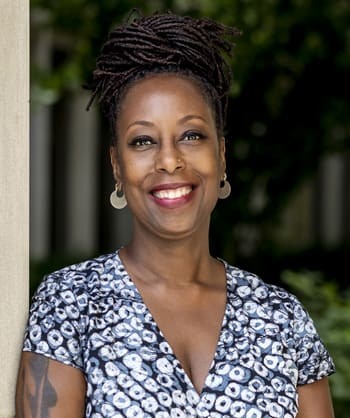

Professor, English and African & African Diaspora Studies

Stokes Hall S473
Telephone: 617-552-3717
Email: rhonda.frederick@bc.edu
Caribbean and Post-colonial Studies; Cultural Studies; Narratives of Migration
Rhonda Frederick is a Professor of English and African & African Diaspora Studies (AADS) and former director of AADS at Boston College. She teaches courses on Anglophone Caribbean and African diaspora literatures, and on popular fictions (fantasy, science fiction, romance, mystery/detective, horror, thriller) written by black writers. Her research interests include Caribbean and Post-colonial Studies, Cultural Studies, and narratives of migration. She is the author of "Colón Man a Come": Mythographies of Panamá Canal Migration (Lexington Books/Rowman & Littlefield, 2005), a book that examines Caribbean literature’s recurrent figure of the Panamá Canal worker, and Evidence of Things Not Seen: Fantastical Blackness in Genre Fiction (Rutgers University Press, 7/2022), a book about how blackness is depicted in popular novels and short stories by black writers.
https://www.rutgersuniversitypress.org/evidence-of-things-not-seen/9781978818064
Evidence of Things Not Seen: Fantastical Blackness in Genre Fictions is an interdisciplinary study of race in the Americas. The “fantastical” in fantastical blackness is conceived by an unrestrained imagination because it lives, despite every attempt at annihilation; this blackness also amazes because it refuses the limits of anti-blackness. As put to work in this project, fantastical blackness is an ethical praxis that centers black self-knowledge as a point of departure rather than as a reaction to denigrating dominant narratives. Erotic romance, mystery/detective, fantasy, mixed-genre, and science fictions’ unrestrained imaginings profoundly communicate this quality of blackness, specifically in the work of BarbaraNeely, Tobias Buckell, Colin Channer, Nalo Hopkinson, and Colson Whitehead. Ultimately, the imaginable possibilities in these popular genres offer strategies through which readers can ask different questions of and for blackness. When black writers center this expressive quality, they make fantastical blackness available to a broad audience that then uses its imaginable vocabularies to reshape extra-literary realities. Ultimately, popular genres’ imaginable truths offer strategies through which the made up can be made real.
The Colón Man—a laborer named after Panamá’s Caribbean port city— was the subject of historical, sociological, and geographical research; “Colón Man a Come”: Mythographies of Panamá Canal Migration is the first examination of imaginings of this Panamá Canal laborer. The book traces the Colón Man through contemporaneous histories that convey the importance of the canal as an engineering achievement and as a sign of the US as a global power; it then examines more recent historical accounts that insert Colón Men into histories and geographies, marking these workers as integral to the successfully completed canal. Literary, lyrical, and personal narratives conjure these narratives—and they tell tales that other disciplines leave untold. Literary narratives of the Panamá Canal draw on “imaginable truths” that characterize this migrant and migration. Yet the import of these imaginable truths is that they informed Colón Men’s experiences with migration, labor, ethnicity/race, status/class, and masculinity. The disparities between creative, first person, and historical depictions of isthmian migration suggest that fictive renditions of canal work and workers represent Colón Men’s qualitative, imagined, and imaginable realities.
Works in Progress
Articles
Entries/Reviews
Interviews
Emerging Voices, New Directions/Ford Foundation/Bowdoin College Summer Grant, 2003.
Scholars-in-Residence Fellowship, Schomburg Center for Research in Black Culture, 2001-2002.
DuBois-Mandela-Rodney Fellowship, University of Michigan, 2001-2002. (declined)
Faculty Fellowship, Boston College, Fall 2001. (declined)
Research Incentive Grant, Boston College, Spring 2000.
American Studies Association (ASA)
Association of Caribbean Women Writers and Scholars (ACWWS)
Caribbean Studies Association (CSA)
Modern Language Association (MLA)